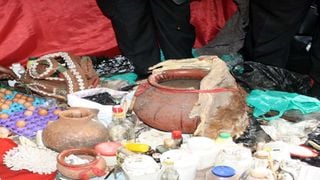
Police officers inspect suspected witchcraft paraphernalia.
| File | Nation Media GroupNews
Premium
What Kenyan law says about witchcraft
Over the years, several elderly men and women have been lynched in Kisii and Nyamira counties for allegedly practising witchcraft.
In the latest incident on Sunday, in Nyagonyi village in Marani, Kisii, four elderly people -- three women and a man -- were killed following the abduction of a secondary school student who was later found unconscious.
The elderly in Kisii live with the constant fear that they could be labelled witches and lynched once the sun dips over the horizon ... every day.
The Directorate of Criminal Investigations (DCI) has promised to bring those responsible for the deaths to book. Those killed were identified as Jemima Mironga, 60, Agnes Ototo, 57, Sigara Onkware, 62, and Sindege Mayaka, 85.

Police carry charred remains of a villager who was lynched in Kanunada, Mosocho Division in Kisii County.
Several men who are known to have killed ‘suspected witches’ over the years are, however, free, waiting to pounce on their next victim. Assuming that witches and genuine witchdoctors exist, how are they identified? There are no universal criteria on what constitutes a witchdoctor.
However, what does the law say about witchcraft?
The Witchcraft Act in Kenya (Chapter 67) protects the public against acts of a person practising witchcraft.
“Any person who holds himself out as a witch doctor able to cause fear, annoyance or injury to another mind, person or property, or who pretends to exercise any kind of supernatural power, witch craft, sorcery or entrenchment calculated to cause such fear, annoyance or injury, shall be guilty of an offence and liable to imprisonment for a term not exceeding five years.”
This means that the police can arrest and take to court anyone practising witchcraft, and just like any other suspect, the alleged witches are entitled to a fair hearing in the court of justice.
The Witchcraft Act under Section 6, which talks about charging persons with witchcraft, provides for the punishing of anyone who harms a suspect and says; “Any person who accuses or threatens to accuse any person with being a witch or with practising witchcraft shall be guilty of an offence and liable to a fine not exceeding five hundred shillings or to imprisonment for a term not exceeding five years.”
Chiefs who encourage or facilitate witchcraft, or the doing of any act contrary to the provisions of the Witchcraft Act, or who knows of the practice but does not report it to a DC, is liable to a fine not exceeding Sh500,000 or to imprisonment for a term not exceeding three years.
If a chief makes a report to his superiors concerning a person suspected of practising witchcraft, the DC may -- after inquiry and is satisfied that the suspect is likely to cause fear, annoyance or injury in mind, person or property to any other person by means of pretended witchcraft -- order the suspect to reside in any locality within his district to be named by the DC, and alternatively, or in addition to, report at the DC’s office every seven days or at longer intervals until further orders, the Act says.
Suspect lynching and killing is punishable by law.

Three old women and a man suspected to be engaging in witchcraft were burnt to death by angry villagers in Marani, Kisii County.
Article 29(c) of the Constitution provides that “every person has the right to freedom and security, which includes the right not to be subjected to any form of violence from either public or private sources.” This right is also guaranteed to suspects of crime.
Engaging in mob justice is a criminal offence that is punishable by the law. If arrested for mob lynching or even killing, one could face assault and/or murder charges as per the Penal Code.





